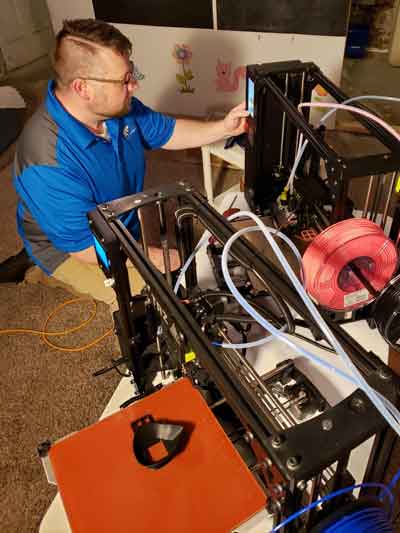AdapT lab seeks to help those with disabilities
June 2, 2020

Life’s little hurdles affect all people with modern day problems such as keeping devices charged.
“We all have issues at home with computers having sufficient charge and enough outlets to keep going on various tasks,” said Dr. Peter Hoesing, Director of Sponsored Programs. Individuals with disabilities can have additional hurdles while navigating life from a powered chair or scooter.
Solving this and other accessibility issues is a passion for Dakota State English professor Dr. Justin Blessinger, director of the Adaptive Technologies (AdapT Lab) at the Madison Cyber Labs (MadLabs).
He often works with fellow DSU faculty member Dr. Chris Olson, who uses a powered chair. This collaboration gives Blessinger a way to learn the hurdles that can affect someone’s day, just by “being with folks who are frustrated by certain hurdles, not hurdles that are make or break, but those little things that impede or add extra minutes to someone’s day,” he stated.
Hoesing noted that “the way Justin talks through these issues reminds us there’s a common denominator, with the goal of ultimately solving a human problem.”
Blessinger is working on a device for users of powered chairs and scooters to draw power from the batteries to charge devices. For this project, he learned that charging sockets on power chairs and scooters were initially designed with a caregiver in mind, so are not easily accessed by the person with the disability.
“What we’re trying to do is give people with disabilities control over things they own,” he stated, giving them access to make choices about what other devices they might want to power, such as phones, computers, or tablets. He is using tools such as 3D printers to create prototypes, which are tested by the Center for Disabilities in Sioux Falls. He also sees opportunity to work with area organizations such as the Lake Area Improvement Corporation (LAIC) and local businesses such as Global Polymer.
Commercialization of inventive technology such as this is difficult to do, Hoesing pointed out. To help facilitate this, AdapT Lab recently received a $25,000 i6 Biosciences grant to facilitate commercialization and technology transfer. The grant is from the U.S. Economic Development Administration, a bureau within the U.S. Department of Commerce Office of Innovation and Entrepreneurship. The funds will be used to purchase necessary tooling, materials, electronics, and hardware to improve an existing prototype from the private sector, test it, and facilitate the device’s trajectory to market.
“As MadLabs operates in the space between higher education and the private sector, this will help transfer technologies equitably from research to reality, or in the case of the i6 fund, from private prototype to university research to market reality,” said Hoesing. He credits the Governor’s Office of Economic Development and Mel Ustad, project director at SD EPSCoR (Established Program to Stimulate Competitive Research), for their part in facilitating the grant.
For MadLabs and AdapT to have received this grant is a vote of confidence to make that transition from start-up R&D to private sector relevant commercial R&D, Hoesing stated.
“In the grand transition of MadLabs from an umbrella concept to a building and a physical lab, one of the over-arching goals we have seen is a shift from research only to research and economic development,” said Hoesing said. “What Justin is doing could have fairly significant economic impact because he’s committed to working with partners as close to home as possible, and we’re excited about what that could mean for the future.”
The prestige of this grant is amplified because no one at DSU has secured funding to launch a private/public partnership in recent memory, Hoesing stated, and the fact that it’s happening in the first year after opening the new facility makes it rather high profile.
“So often it is discussed how technology can cause us to isolate or withdraw, but it’s worth celebrating the many ways tech does the opposite,” Blessinger said.
Hoesing agreed. “If tech can help us humanize each other in that way, I’m all for it.”
